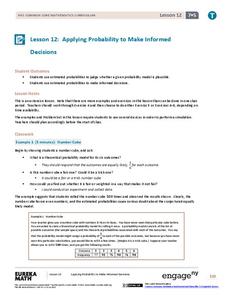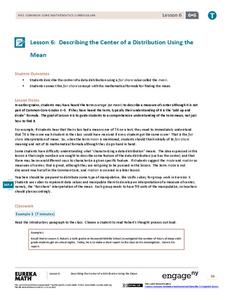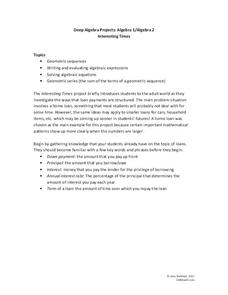Virginia Department of Education
Properties of Quadrilaterals
What type of quadrilateral is that? Discover the difference between the types of quadrilaterals. Small groups investigate types of quadrilaterals using geometry software to find their properties. To keep track of the different...
EngageNY
Applying Probability to Make Informed Decisions
Use simulations to determine the probabilities of events to make decisions. Class members are presented with several scenarios, some with known probabilities and others without. Groups run simulations to gather data that they then...
EngageNY
Describing the Center of a Distribution Using the Mean
Everyone does their fair share. The sixth segment in a 22-part unit presents the mean as a fair share. Groups build a conceptual understanding of the mean of a data set, rather than simply learn an algorithm. Learners use the...
Scholastic
Study Jams! Area of a Triangle
Even though there is a wide variety of different triangles in the world, knowing a single equation allows us to find the area of each and every one of them. Follow along with this step-by-step presentation as Zoe clearly models how to...
Scholastic
Study Jams! Add & Subtract with Common Denominators
RJ and Zoey are at camp and need to get back to the mess hall for lunch, but they don't know how far they have to walk. Help them figure out the distance while teaching young mathematicians how to add and subtract fractions with this...
Scholastic
Study Jams! Function Tables
Each week Mia saves a certain portion of the earnings from her babysitting job. Help her figure out how much she can save this week with a step-by-step presentation on function tables. Given a set of inputs and outputs, the process for...
Curated OER
Chain Connection and Un-Connection Activity
Learners practice remaining on topic during a conversation using printouts of chains as visual models for their work. Chains are placed in sequence while students stay on a shared topic of conversation, and a broken chain is used as...
Mathematics Assessment Project
Modeling Motion: Rolling Cups
Connect the size of a rolling cup to the size of circle it makes. Pupils view videos of cups of different sizes rolling in a circle. Using the videos and additional data, they attempt to determine a relationship between cup...
Virginia Department of Education
Probability
Classes explore different scenarios using manipulatives to learn about the difference between independent and dependent probability. Learners experiment with colored chips to model the two types of probabilities. To test their...
5280 Math
Interesting Times
Gain a little interest in functions with a real-life task. Young scholars analyze home loan data with a geometric sequence and series. They use the models to make predictions about the total loan payments at certain intervals in a...
Curated OER
Order Numbers to 50 (L)
In this ordering numbers worksheet, learners solve 15 problems in which a group of ten numbers below 50 are ordered. There are no examples or directions as to whether the numbers are to be least to greatest or the opposite.
Curated OER
Order Numbers to 50 (N)
For this ordering numbers worksheet, students solve 15 problems in which a group of ten numbers below 50 are ordered. There are no examples or directions as to whether the numbers are to be least to greatest or the opposite.
Curated OER
Order Numbers to 50 (Q)
In this ordering numbers worksheet, students solve 15 problems in which a group of ten numbers below 50 are ordered. There are no examples provided.
Curated OER
Order Numbers to 50 (P)
In this ordering numbers activity, learners solve 15 problems in which a group of ten numbers below 50 are ordered. There are no examples provided.
Curated OER
Fraction Circles
Fourth graders receive a fraction circle and show how each different part makes a whole. Students compare the different fractions that make up a whole. Students choose 2 fractions which are inside a bucket and they compare them both...
Curated OER
Math Jeopardy
Students, in teams, play Math Jeopardy against each other as a way to reinforce their skills.
Curated OER
Equivalent Fraction Munch with Pizza Pie
Learners demonstrate fractions and mixed numbers using concrete pictorial models of pizza. They relate symbols to the models.
EdHelper
Ordering Numbers
In this ordering numbers worksheet, students order 11 groups of numbers from largest to smallest. Worksheet is labeled "sample" and is part of a subscription site with links.
EdHelper
Ordering Numbers #2
In this ordering numbers worksheet, learners order groups of numbers from smallest to largest. Worksheet is labeled "sample" and is part of a subscription site with links.
Virginia Department of Education
Modeling Multiplication of Fractions
Multiply your understanding of multiplying fractions. A short lesson teaches pupils how to multiply fractions. By using fraction models, they get a better understanding of the concept.
Curated OER
Unidades y Decenas
Using examples of numbers less than one hundred, this presentation in Spanish provides a visual representation of arrays. It would be a great way to help learners understand the concept of tens and ones.
Curated OER
Count by 5s, 10s, and 100s
There's an easier way to count! Scholars get practice counting by 5 and 10 in this skip-counting worksheet. There are 10 problems, and for each they observe a set of objects that have been grouped. Learners skip count to get a final...
Curated OER
Counting Numbers 0-30
Counting can be fun and it is always a good idea to begin counting practice with concrete objects. Kindergartners hear the story "Five Little Monkeys," then practice grouping, counting, and documenting (drawing) sets of five.
Curated OER
Naming the Pattern
In this pattern activity, 2nd graders complete fifteen number patterns and explain the counting pattern for each group. Students also complete five picture patterns and label each of the patterns.























